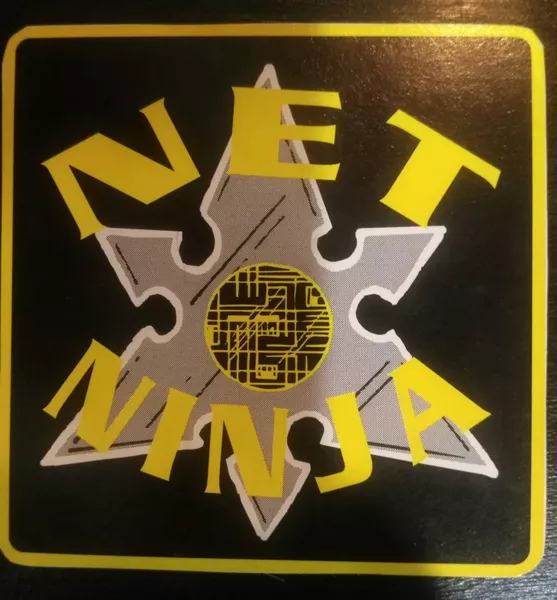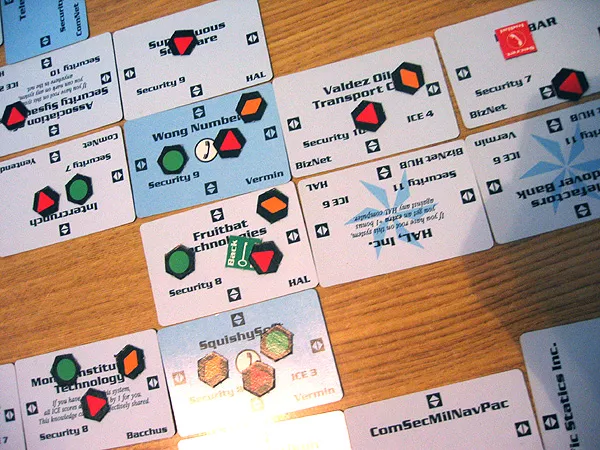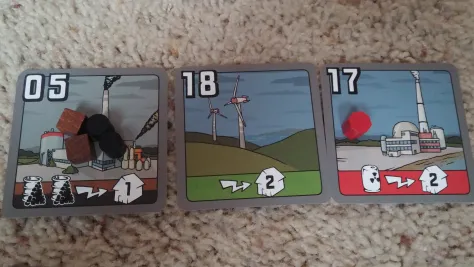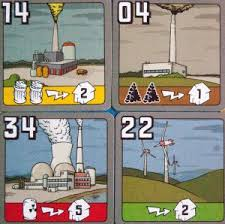
Hacker
This is the computer crime card game inspired by the 1990 Secret Service raid on Steve Jackson Games. Play is similar to Illuminati except players play cards as part of the ever-expanding "Net" in the center of the table instead of having individual card stacks. Players use indials to break into systems and gain root access. Upgrade your hacking tools, deal with other hackers for access, phreak others onto your system, etc. is all part of the game. Avoid ICE and law enforcement raids to gain the greatest number of root access sites and win the game.
Yep you read that correctly.
In the course of that visit, it became clear that the investigating agents considered GURPS Cyberpunk to be "a handbook for computer crime." They seemed to make no distinction between a discussion of futuristic credit fraud, using equipment that doesn't exist, and modern real-life credit card abuse. A repeated comment by the agents was "This is real."
"This is real"
lol
Can you imagine a bunch of dorks running around LARPing on a Cyberpunk role playing game and then the cops bust in acting like it's real? What an embarrassing joke. Steve Jackson Games eventually created this Hacker board game that makes fun of the whole situation.

I played this game several times with some friends back in the day. I wouldn't say it's particularly good, and there are plenty of other games that are certainly better, but it did get me thinking. What if we were to adapt a game like this to the blockchain and actually use it to learn real skills? The gamification of education has been a topic on my mind for over a decade.
Every once and I while I'd brainstorm some ideas for what a game like this would look like. I have a couple of different drafts and conflicting ideas that need to be consolidated at this point so I figured I'd give the basic gist of it in this post.
Overall Arc
The main point of Net Ninja is learning. The game being fun is a completely secondary goal designed to facilitate the primary goal of learning Javascript (and potentially Node.JS and maybe even Python). With this in mind if I was tasked with a decision between implementing a mechanic that made the game more fun at the cost of dumbing down the learning environment I would probably have to decline such a pivot. That's just not how I envision this particular product. Of course if the game was open source it could be forked down that path, just not by me.

Our story begins.
The game starts with you, the hero (or antihero as the case may be), living in your parent's basement. Maybe you're a teenager with some kind of tragic backstory like Harry Potter (parents died w/ evil relatives). Maybe you're the troll above from the WOW Southpark episode. Maybe you're a nerd girl that dropped out of college. Who knows. Perhaps maybe these avatars even have unique abilities associated with them.
In any case you somehow stumble upon a lower-powered computer. Could be a Raspberry Pi you got for Christmas. Could be you found it in a dumpster. Doesn't matter; you've got a computer now; a computer in the dungeon that is your basement.
From here you're able to find some remote work. Maybe it's not even paid and the player has to get experience on an unpaid internship; figuring out the absolute basics from "Hello World" to String and Array manipulation. But what if while working you found a password to a lock? Would you ignore it or break inside? Would you steal to get ahead or do you take the more honorable path? Our choices within the game push us into the Blackhat or Whitehat alignment, each with its own doors that open or close depending on the decision tree.

Resources
Once the player gets past the basics, several resources become available.
CPU
CPU is a representation of the player's network's total potential. It's a versatile resource that can be spent in a number of ways, including hacking other targets, mining Crypto, running scripts/AI, DDoS, installing spyware, sending spam email, etc. The best allocation of this resource must be determined by the player.
POWER
Computers can't run for free, and to operate a vast network you'll need quite a bit of POWER. Not having enough of this resource lowers CPU so it can be thought of as a supporting resource to the main one.
POWER will be represented by power plant NFTs. There will be several types of POWER with a strategic focus on overhead cost vs operating cost vs volatility. For example a wind-power card might have high overhead and volatility but zero operating cost (sustainable). Whereas coal power would have zero volatility with medium overhead and medium operating cost (burns coal). It's also possible that creating a lot of pollution would push a player's avatar into a more blackhat direction, and vice versa.

Battery
Batteries or backup-power would be a tertiary resource that compliments volatile power plants. For example maybe you've got a bunch of solar power but that only gives you sustainable power for half of a game day. You'll need to buy some kind of accumulator to bank extra power during the day so that you don't run out at night. It may be possible to run gas-powered backup generators on-site (expensive) or even buy energy from other nearby players/NPCs if necessary.

CRYPTO
It wouldn't be a game on the blockchain without a currency, and what better money than CRYPTO? Rather than give this currency an actual name (like NINJA) I think it's much better and funnier to just call it CRYPTO. CRYPTO can be mined with CPU or stolen from NPCs or even other players. The details of all these mechanics need to be very well thought out to prevent exploitation or unfair advantage.
However I think for the most part it will not be very smart to stockpile CRYPTO. There will be many CRYPTO sinkholes that highly incentivize spending money in a game of max-velocity hot-potato. The more money one holds the bigger of a target for attack they become. Will you take the quick upgrade or double down and risk it all for something better?
ALIGNMENT (reputation)
As stated previously players will have a good reputation (whitehat) or a bad reputation (blackhat). Some contracts/quests will only be available to those with a high enough reputation score within the associated area. It may be possible to play an opportunist class as well that has access to none of the high level contracts but has their pick of both sides in the mid range.
Logistics (PING & PORTS)
There's a very high chance that a game like this needs to have a lot of logistical friction that exists within the real world but not online. For example if someone wants to trade CRYPTO to another node the cost of moving it there might be based on distance (PING). The farther away two nodes are from each other the higher the latency (PING). It would be more expensive to open ports with them, harder to hack them, and money transfers come with a higher fee. While not realistic, these types of game mechanics can increase the strategy by orders of magnitude.
4 Tiers of Pwnership
There are four different levels of access to a node.
Each level has different perks depending on the context of what the node actually does.
- Guest (limited access)
- Member (basic access)
- Root (admin access)
- Owner (yeah you own it but you also have to pay for it)
There will be situations where other players hack into your nodes and booting them off will be more expensive or time consuming then just letting them use it. But hey it's your decision. Play it your way, hotshot.

ASCII NFTs
WEB3 gaming is defined by decentralization, which means that player-generated content has to be a main focus. It would be interesting to see ASCII pictures be tokenized and owned by players and used in-game. Something to think about. Perhaps there's even the potential to create ASCII GIFs that are somewhat animated. It's interesting because this type of content is quite small and could feasibly be stored directly on the Hive blockchain.
Black box vs White box (Privacy Concerns)
There are many advantages to centralization especially when it comes to privacy. For example, how could someone hide that they were hacking another player in game if they are doing it on the Hive blockchain and everyone can see everything on a public ledger? This is a very tricky problem to navigate. Without privacy there is no fog-of-war, and without fog-of-war everyone can see everything going on in the battlefield which is not good for PvP mechanics.
A potential way of solving this problem is a little script I wrote many years ago (I need to go find it). The player would essentially SHA-256 hash what they were doing and post the hash to the chain. So everyone knows they are doing something but they don't know what. Then after that action succeeds they can reveal to the network what the action was by posting the action + password that maps to the correct hash. Hell, maybe they weren't doing anything and it was just a psych-out. Unfortunately this is only beneficial in situations where the player's action doesn't need a response from another player or the nodes running the game in real time.
Who controls the keys?
Say someone sets up a password to guard some kind of resource and you want to hack them. This is a peer-to-peer operation if there is no centralized server to handle all these requests and maintain privacy. So if the password is "RED GREEN BLUE" and I guess "RED GREEN BLUE" how do I know if I got it right? I have to trust the person who I am attacking to tell me "good job you win"... which is obviously a conflict of interest. Again there are ways around this, but these are the types of issues we run into when we can't trust a centralized authority to handle all the escrow, privacy, and trusted authority concerns. Decentralization creates quite a bit of added complexity. Especially when privacy is concerned.
Zero-Knowledge proofs?
In theory ZK technology could help us solve these problems, but considering I haven't seen a single game actually pull it off I have to assume that it's far too expensive (computationally and otherwise) to actually implement. Unfortunately at this point I'm way off topic and out of scope at this point worrying about the technical details.

Creating an economy
Any massively multiplayer game needs any economy, but what exactly does that mean? At its core, an economy is the emergent result of the people within that economy not being able to do everything themselves. We all have our specializations and we offer our services in return for the specializations of others.
Within the context of Net Ninja this means there needs to be a way to be very good at certain things and very bad at others so that every player is both a producer and consumer in a free market. Easier said than done obviously but it's something I think about. Considering that coding itself is an extremely complex skill it may be possible to achieve this requirement organically through actual work being done... and artificially through specifically tailored game mechanics and class synergies.
Sybil Attack
As crazy as it sounds my server for this game would 100% be invite-only. There's no way I would allow random accounts to play. There will be no alts. There will be no bots. Everyone is going to be watching everything. Cheaters will almost certainly make their cheating obvious and get an easy ban... and because the game is invite only it will look bad on you and everyone that vouched for you.
Of course is someone wants to boot up their own version of the game they can configure it with whatever rules they want. I'm only talking about one version of the game. Take WoW for example: that game still has over 200 active servers, each with thousands of players. Impressive stuff. Point being that the resources and players from one server just can't seamlessly transfer to another. One has to get permission and pay a fee, even on a completely centralized service controlled by one company.
Bottom line is that a private server can have whatever rules it wants. Each game server is it's own separate entity; the CRYPTO on one server is not worth the same as it is on another. Different servers have completely different supply and demand levels based on multiple chaotic factors.
Creating an invite-only permissioned server solves a million different problems. For example what would happen if we gave CRYPTO to low level plebs that just got invited? What would happen if you got CRYTPO for solving "Hello World" in Javascript? Obviously some asshole with a bot army is going to create 50,000 bogus accounts and scrape all those free gains with a basic script. Can't have that. Veto.
Conclusion
Well this post is far too long and the scope is far too broad but that's perfectly on-brand for a guy like me. I'm not exaggerating when I say I've been thinking about this game for years, and I could easily write another 5000 words on it without getting writer's block.
So yeah tell me what you think. Would you attempt learning Javascript if there was a game that paid you CRYPTO to do it? I suppose the devil is in the details on this one.
Posted Using InLeo Alpha
You might just have something there... It sounds like it could be interesting. I know some of the techs that work in other districts from me have played a threat assessment card game. The general premise is you have a breach in your network. The cards determine the breach and why you know about it, then you go from there. I've never played it myself.
Making learning fun is key to spreading knowledge.
Thanks!
Illluminati? Count me in.
yes I would give this a shot. It might be my best chance at actually learning to code....
I had another game idea for Hive, but Ive no idea if its feasible or not (or to what extent)
It was after hearing task complaining about how few posts people are posting on inleo
I thought....
we need more gamification on hive
what if we created multiple factions, red,blue,gold,slytherin etc. and any user could freely join up to any faction they preferred
at any point you can go to your faction page to see if there are any quests to pick up
these quests could take many forms, but one thing I was thinking was you could use key words in comments to create bases, or forts that can then be attacked by other teams or defended by your own.
Every user would have a limited amount of impact they could make every day but this could be levelled up with involvement, and perhaps there would be some stake-weighted abilities too.
The main incentive would probably be leaderboards
but of course there could be a token involved, or some nft badges that give you more abilities within the game.
Imagine as a curator, being able to build a fort on a piece of content you like, which then attracts a bunch of other people to come and comment in a sort of pitch battle to own the content.
is that cool? Or is that just really annoying?
Either way, it would be increasing engagement